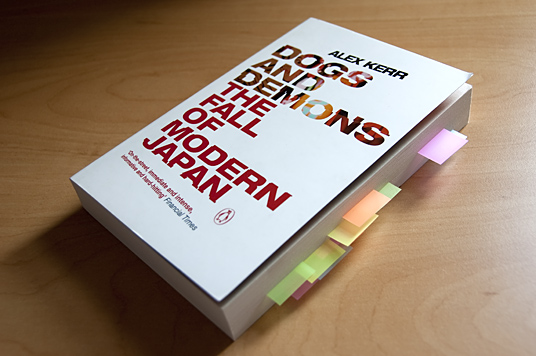Alex Kerr is no stranger to Japan, his books and history demonstrate a continuing personal involvement and deep affection for the country which is hard to find in many foreigners. Perhaps best know for the seminal Lost Japan, Dogs and Demons: The Fall of Modern Japan was published eight years later in 2002 and aims to get to the heart of how Japan as a nation has been degrading since the Second World War and before. At times it is a bleak and unforgiving book that aims with ruthless precision to uncover why Japan, once sequestered, then exposed, then devastated, then superior and now, supposedly irrelevant, has become that way. By and large it succeeds and prises open a world that no other book has had the courage to touch upon - indeed Kerr expands on this at many points throughout the ~400 page book. Unfortunately though it is hamstrung by many arguments which boil down to personal opinion and though convincing, it is difficult not to see this as only one side to a very complex and pertinent argument.
Split into sizeable chapters, the book covers a wide variety of topics that span from the opening chapter's examination of the Construction State ideology which underpins a lot of the book, through to the perceived cultural downfall of both traditional and modern arts. The title of the book is explained in the prologue and concerns illustration: anyone can draw a demon, pompous and effulgent, there is no real world counterpart or use to it and it cannot be easily said to be "wrong"; dogs on the other hand are harder to draw because everyone knows what a dog looks like and though it is easy to draw incorrectly. The analogy being that Japan favours the drawing of demons, it prefers to erect monuments and flash instead of dealing with the harder to draw issues that are endemic to them. The idea of distraction over solution. It's a fine analogy and one that permeates the book but it becomes tiresome by the conclusion when it seems most everything is conspicuously, almost tenuously fed back into it rather than left as a given.
The core problem the book suffers from, apart from being an accomplished but disheartening read, is that it swaps too easily between the quantifiable and the opinionated. Many arguments when supplemented by the judicious application of statistics are self evident: financial figures for the banks and the disparity between savings and government expenditures are easy wins - especially so in a time when everyone is all too aware of the need to be thrifty. Even anecdotal but verifiable stories such as those of the chains of business for non-governmental organisations in order to keep public servants in jobs and flush with money are infuriating, much of the first five chapters of the book feel like a real world demonstration of Catch 22.
Then there are the blatant personal bugbears which are neatly slotted in between the more robust chapters, keenly spaced so the distaste for the bureaucrats is still on the tongue when the author speaks of the damming of rivers or the transformation of Kyoto. It is here that the harder sells are pitched and where the most murky of outcomes is suggested - the running theme throughout the book, whether intentional or not, is of how Japan has offered a façade to outsiders that presents itself as a very modern and powerful country, yet the native reality is anything but. The fundamental argument being that if one doesn't agree with the opinions proffered that they perhaps aren't familiar enough with the country to know any different. This taps into an undercurrent that has been building for a while around foreign opinion with Japan, a backlash against its cultural exports and its wholly inferred promise of being the golden land; the result being an increasingly vocal minority apoplectic with fury, willing to engage in long diatribes as to why they have been slighted by an ephemeral dream.
Subsequently, the book is a harsh and melancholy read that could turn off all but the most ardent Japanophiles. It is here though that it becomes most clear that while however true and heartfelt the argument is, it is but one side of it. Most fans of anime will be familiar with the schooling system present in Japan and even cursory further reading will flesh out many of the exaggerations present in many series; Kerr however argues that the schooling system is designed to produce automatons with rote learning of facts rather than fostering creativity and individuality and represents the root of many problems to do with authoritarianism and collectivism that many of the country's ills are born from. His most potent line of reasoning is that the schooling system combined with the hand holding present within daily life is an effective form of emotional control, able to bend the will of the people and subjugate them into obedience. Its a bold claim and there is evidence to support some of it, but it's only when taking a step back and looking at the creativity and the culture that is still offered by Japan that this firebrand topic begins to wane in potency.
From there, his other arguments are open to further scrutiny and many of the topics brought up can be labelled as the author's opinion that they are contributing to Japan's downward spiral versus the others which can easily demonstrate so. This is the crux of how affecting the book will be: based not on how readily a reader is swayed, but how familiar they are with the subject matter. For some this could be a revelatory text, giving voice to all of their gripes and crystallising their opinion on a nation in decline; others could scoff and see it as a foreigner's, albeit a very well informed and passionate foreigner's, opinion on a country, an argument based upon comparison rather than fact. The book's best aspect however is not its message but the breadth of topics it covers. Anyone who is even glancingly familiar with Japan will find something to hook onto, likely towards the beginning, standing them in good stead for the later, denser chapters; anime fans in particular will find many elements of the book inadvertently touch on aspects raised in the medium, the book's specific coverage of it meanwhile is fleeting at best.
Begun in 1995 - in the middle of the prolonged recession Japan suffered that decade - and after a revision, this book was released in 2002. Eight years is a not insignificant period of time and that fact has taken some of the string out of the message the book offers - in a way it acts a touchstone for a country exiting a period of stagnation and turbulence but whether anything has changed in the meantime is the biggest question. In that way, the book is only the beginning of the reading necessary to understand a complex and involved subject - identified by the many tabs I affixed to the book while reading. It was not the poignant and affirming read that I had expected it to be, and many times it was difficult to continue once it became clear the balance I expected was to be relegated to a final summation chapter. Regardless, despite not agreeing with the author, the book remains a superb read not simply for offering an provocative insight but for investigating a topic that needs exposure for solutions and grass-root changes to flourish. It isn't the easiest gateway to contemporary reading on Japan but it is one of the most evocative and thought provoking and deserves reading for the avenues it opens just as much as the superb coverage of its chosen topic.


The arguments against modern entertainment and media he makes towards the end of the book were some of the most contentious for me; the author seemed to want to link the popularity of child-focused movies with the perceived mental regression of Japanese society towards a child like state - neither of which I agree with. So like you say, he castigated companies such as Toho for producing money earners rather than more culturally significant films. The worst part I felt was his anecdotal story of visiting a single studio and seeing old equipment which somehow implies all other ones are just as antiquated. Thankfully the author seems to realise this isn't a strong argument and spends little time on it.
I couldn't even venture a guess as to how much issues like this are discussed within Japan or whether they have any traction with institutions such as the late night talk/panel shows. Lamentably my only sources of info are second or third hand which are less than ironclad.